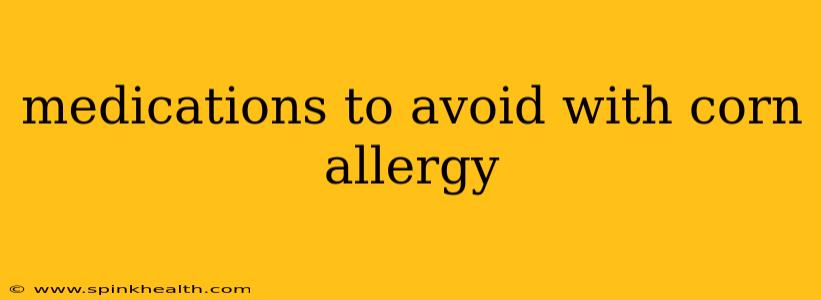A corn allergy, while less common than other food allergies, can be serious. It's not just about avoiding corn on the cob or cornbread; many medications contain corn-derived ingredients, making it crucial for individuals with corn allergies to be vigilant. This can be a real challenge, as corn is a prevalent ingredient in numerous pharmaceutical products. Let's delve into the world of medications and corn allergies, exploring what to watch out for and how to stay safe.
My journey into understanding corn allergies began with a close friend's severe reaction to a seemingly innocuous over-the-counter pain reliever. Witnessing her distress highlighted the critical need for awareness and proactive measures. This article aims to equip you with the knowledge to navigate the pharmaceutical landscape safely and confidently.
What are Common Corn-Derived Ingredients in Medications?
Many medications contain corn-derived ingredients, often hidden under less obvious names. Knowing these is the first step in avoiding a reaction. These ingredients can include:
- Corn starch: Used as a filler or binder in tablets and capsules.
- Corn syrup: Acts as a sweetener or diluent in liquid medications.
- Corn oil: A common excipient (inactive ingredient) used in various formulations.
- Dextrins: Derived from corn starch, these are used as binders and adhesives.
- Maltodextrin: Another cornstarch derivative, frequently found in oral medications.
How Can I Identify Corn-Derived Ingredients in Medications?
Unfortunately, there's no single, easy answer. The challenge lies in the fact that many medications don't explicitly list "corn" on the label, opting instead for the more technical names listed above. Here are some strategies you can employ:
- Carefully review the label: Scrutinize the inactive ingredient list meticulously. If you see any of the corn-derived ingredients mentioned above, proceed with caution.
- Contact the manufacturer: Don't hesitate to contact the pharmaceutical company directly. They can provide a detailed breakdown of the ingredients and confirm the absence or presence of corn derivatives.
- Consult your allergist or pharmacist: These professionals are your best allies in this process. They can provide guidance based on your specific allergy and help you identify safe alternatives. Your allergist can also perform specific allergy testing to determine the exact nature and severity of your corn allergy.
What Types of Medications Commonly Contain Corn Derivatives?
The range of medications that might contain corn derivatives is quite broad. While it's impossible to provide an exhaustive list, some common examples include:
- Over-the-counter pain relievers: Many pain medications use corn-derived fillers and binders.
- Vitamins and supplements: Several supplements contain corn syrup or corn starch as fillers.
- Oral medications: Tablets and capsules frequently utilize corn-derived ingredients in their formulation.
- Injectable medications: While less common, some injectable medications may use corn-derived ingredients in their formulation or solution.
Are there Corn-Free Alternatives?
The good news is, there are often corn-free alternatives available. However, finding them may require some extra effort:
- Generic vs. brand-name medications: Sometimes, generic versions of a medication may use different inactive ingredients than brand-name versions. This doesn't guarantee the absence of corn, but it's worth investigating.
- Compounding pharmacies: These pharmacies can custom-make medications without corn-derived ingredients, offering a tailored solution to your needs. However, this may be more costly and require a prescription.
What Should I Do if I Suspect a Reaction?
If you suspect a reaction to a medication you believe contains corn derivatives, act swiftly:
- Stop taking the medication immediately.
- Contact your doctor or allergist immediately.
- Seek medical attention if symptoms are severe. Severe allergic reactions can be life-threatening and require immediate medical intervention.
Can I still get vaccinated if I have a corn allergy?
Many vaccines contain trace amounts of corn-derived products used in their production. It's crucial to discuss this with your doctor before any vaccination. Often, the benefits of vaccination far outweigh the potential risks, and strategies to minimize reactions can be implemented.
Navigating medications with a corn allergy requires vigilance and proactive communication with healthcare professionals. By understanding the potential sources of corn derivatives in medications and employing the strategies outlined above, you can significantly reduce your risk and maintain your health. Remember, your health is your priority – don't hesitate to seek professional guidance.

